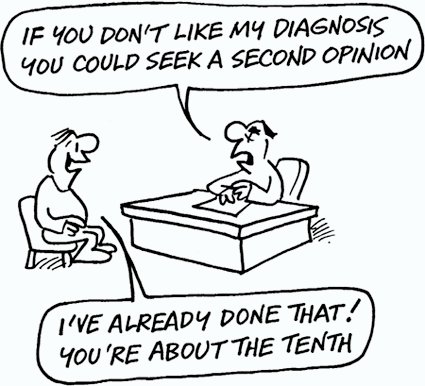Hypochondriasis
Hypochondriasis
Hypochondria is an obsession with the idea the person is suffering from a serious or life-threatening disease that hasn’t been diagnosed yet.
Everyone who worries about health problems is a not a hypochondriac. Having symptoms caused by something that the doctor can’t identify clearly can cause anxiety. In some cases, a second opinion or further tests may be in order. However, if you search the internet for ailments that seem to match your symptoms, the chances are you’ll find something. There is nothing wrong with keeping informed. However, insignificant or minor ailments often share symptoms with more-serious disorders and easy access to information about every possible thing that could be wrong can fuel anxiety. If you are plagued by the idea that something is seriously wrong even though your doctor has done appropriate tests and reassured you that there is nothing wrong, you may have crossed the boundary into hypochondria.
Some factors that may increase the risk of developing hypochondria such as:
- Having a serious illness during childhood
- Having family members or others with a serious disease
- Death of a loved one
- The believing that good health means total freedom from all physical symptoms or unusual bodily sensations
- Feeling especially vulnerable to illness or disease
- Family members with hypochondria
Hypochondria occurs about equally in men and women, and even in children.
Hypochondria can lead to:
- Health risks associated with unnecessary medical procedures
- Work or school problems
- Depression
- Anxiety
- Excessive anger and frustration
- Substance abuse
- Relationship difficulties
- Adjustment disorder
- Financial problems related to medical costs

Symptoms:
- a long-term intense fear or anxiety about having a serious disease or health condition
- Worrying that minor symptoms or bodily sensations mean a serious illness
- Repeated visits to the doctor for the same symptoms, demanding tests such as MRI or CT scans, echocardiograms or even exploratory surgery in spite of the doctor denying any serious illness
- Doctor shopping or frequently switching doctors looking for one who says there is a serious illness
- Continuously talking about the symptoms or suspected diseases with family and friends
- Obsessive health research
- Frequently checking the pulse or blood pressure or exploring the body lumps or sores
- Thinking there is a disease after reading or hearing about it
Treatment:
Treatment for hypochondria includes psychotherapy, education and medications.
- Psychotherapy. Psychotherapy (counseling) is the primary treatment for hypochondria. A form of psychotherapy called Cognitive therapy helps to recognize and stop behavior associated with the anxiety of an illness
- Education. Psycho-education, is a form of of therapy that can promote understanding about hypochondria
- Medications. Medications often help to relieve the obsessive thoughts, anxiety and other symptoms of hypochondria.
